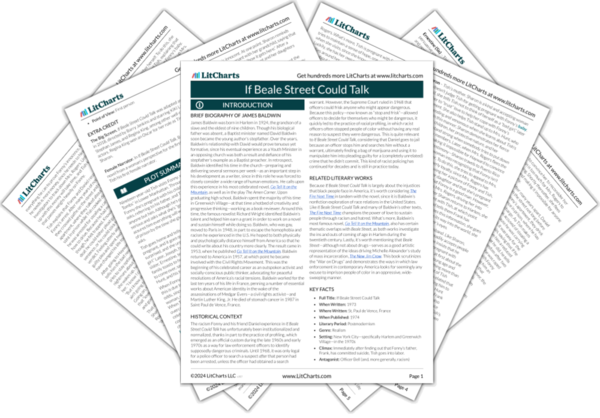Sharon Quotes in If Beale Street Could Talk
Troubled About My Soul Quotes
Now, listen, […] you got enough on your mind without worrying about being a bad girl and all that jive-ass shit. I sure hope I raised you better than that. If you was a bad girl, you wouldn’t be sitting on that bed, you’d long been turning tricks for the warden.
Tish […], when we was first brought here, the white man he didn’t give us no preachers to say words over us before we had our babies. And you and Fonny be together right now, married or not, wasn’t for that same damn white man. So, let me tell you what you got to do. You got to think about that baby. You got to hold on to that baby, don’t care what else happens or don’t happen. You got to do that. Can’t nobody else do that for you. And the rest of us, well, we going to hold on to you. And we going to get Fonny out. Don’t you worry. I know it’s hard —but don’t you worry. And that baby be the best thing that ever happened to Fonny. He needs that baby. It going to give him a whole lot of courage.
She moved away from me a little and put my glass in my hand. “Unbow your head, sister,” she said, and raised her glass and touched mine. “Save the children,” she said, very quietly, and drained her glass.
And Mrs. Hunt added, “These girls won’t be bringing me no bastards to feed, I can guarantee you that.”
“But the child that’s coming,” said Sharon, after a moment, “is your grandchild. I don’t understand you. It’s your grandchild. What difference does it make how it gets here? The child ain’t got nothing to do with that—don’t none of us have nothing to do with that!"
Time: the word tolled like the bells of a church. Fonny was doing: time. In six months time, our baby would be here. Somewhere, in time, Fonny and I had met: some where, in time, we had loved; somewhere, no longer in time, but, now, totally, at time’s mercy, we loved.
Somewhere in time, Fonny paced a prison cell, his hair growing—nappier and nappier. Somewhere, in time, he stroked his chin, itching for a shave, somewhere, in time, he scratched his armpits, aching for a bath. Somewhere in time he looked about him, knowing that he was being lied to, in time, with the connivance of time. In another time, he had feared life: now, he feared death—somewhere in time.
I know I can’t help you very much right now—God knows what I wouldn’t give if I could. But I know about suffering; if that helps. I know that it ends. I ain’t going to tell you no lies, like it always ends for the better. Some times it ends for the worse. You can suffer so bad that you can be driven to a place where you can’t ever suffer again: and that’s worse.
[…]
I don’t want to sound foolish. But, just remember, love brought you here. If you trusted love this far, don’t panic now.
My presence, which is of no practical value whatever, which can even be considered, from a practical point of view, as a betrayal, is vastly more important than any practical thing I might be doing. Every day, when he sees my face, he knows, again, that I love him—and God knows I do, more and more, deeper and deeper, with every hour. But it isn’t only that. It means that others love him, too, love him so much that they have set me free to be there. He is not alone; we are not alone.
Zion Quotes
I opened my mouth to say—I don’t know what. When I opened my mouth, I couldn’t catch my breath. Everything disappeared, except my mother’s eyes. An incredible intelligence charged the air between us. Then, all I could see was Fonny. And then I screamed, and my time had come.
Fonny is working on the wood, on the stone, whistling, smiling. And, from far away, but coming nearer, the baby cries and cries and cries and cries and cries and cries and cries and cries, cries like it means to wake the dead.












